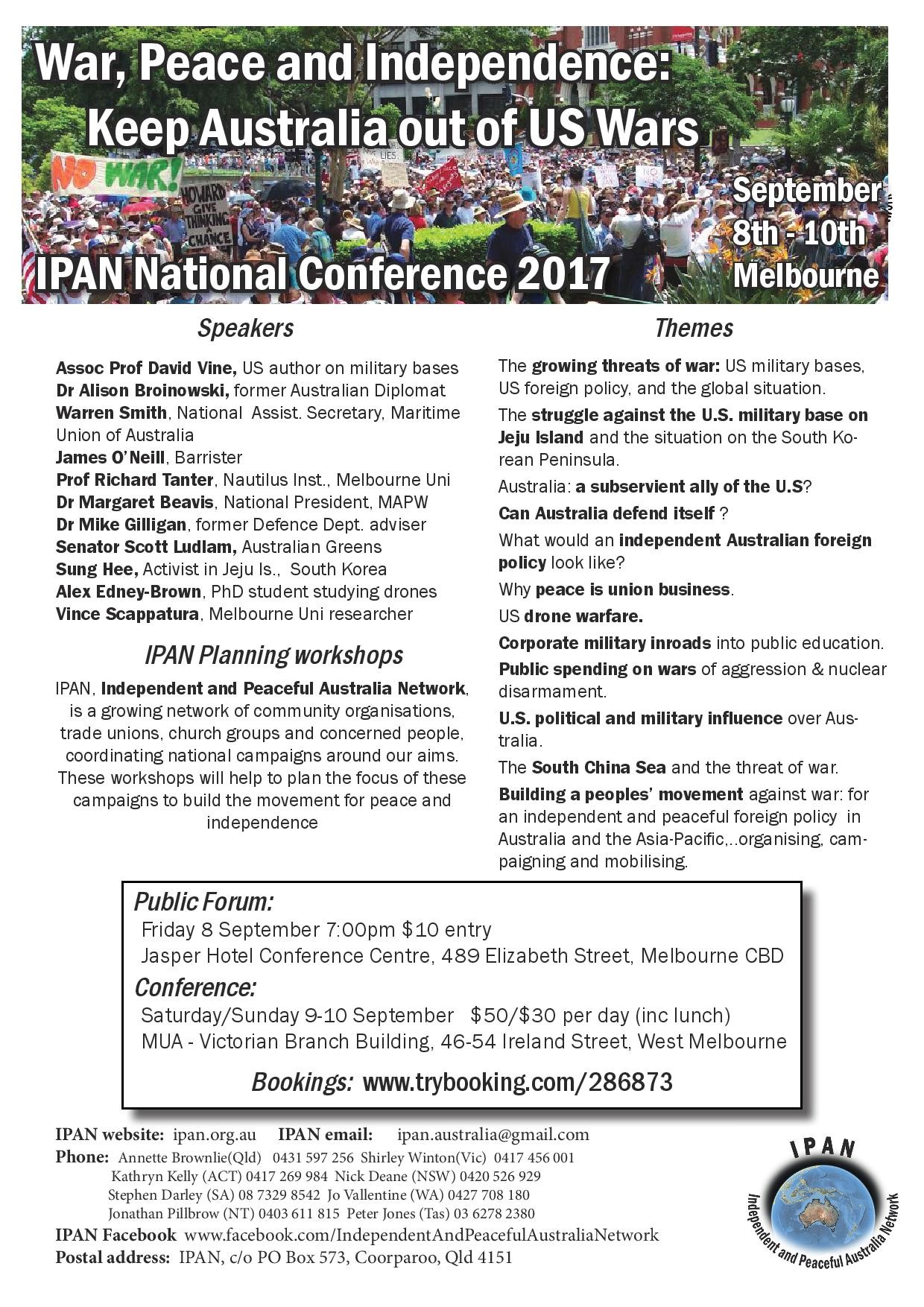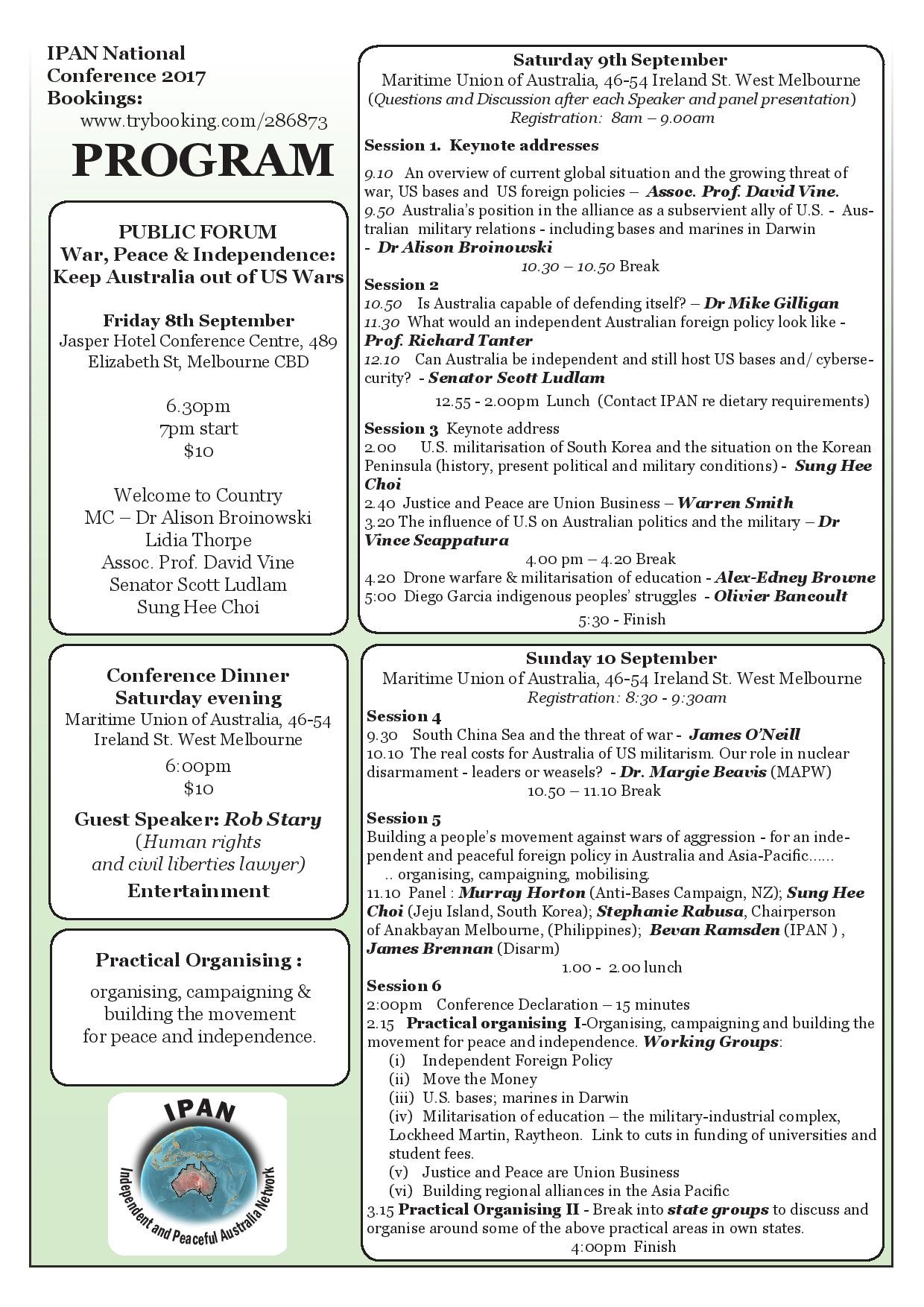In this issue:
- Introducing three speakers for IPAN’s War, Peace & Independence Conference
- IPAN Conference details
- ACT Forum: “War, Peace & Independence”- July 4th
- Trump sells Saudi Arabia mammoth $350 billion in weapons over ten years
- The Ongoing Disaster of Australia’s Policy in Afghanistan- James O’Neill
- Victory at the UN – 122 Countries agree on a Treaty to ban nuclear weapons
- *Around 150 West Papuan people in Nabire arrested, including children; many tortured
- Understanding Korea – Bruce Cummings (Global Research)
- Ban the Bomb – Speech by Stephen Darley at Adelaide Rally
- Brisbane Public Forum: Ban the Bomb”: 13th July
- Ngara Institute Award to Anti-Adani activists
- Australian Universities becoming militarised- Alex Edney-Browne
- Coming event: Newcastle Hiroshima Day March and Rally
 For Conference bookings:
For Conference bookings:
Click on BOOKINGS
Introducing three speakers for IPAN’s War, Peace & Independence Conference
Assoc. Prof.David Vine, US author on US bases
Mike Gilligan– Former advisor to the Defence Department
Sung Hee Choi -activist in Jeju Is, Sth Korea
David Vine
“Today, while there are no foreign bases in the United States, there are around 800 U.S. bases in foreign countries. That number was recently even higher, but it still almost certainly represents a record for any nation or empire in history. More than 70 years after World War II and 64 years after the Korean War, there are, according to the Pentagon, 181 U.S. “base sites” in Germany, 122 in Japan, and 83 in South Korea. Hundreds more dot the planet from Aruba to Australia, Belgium to Bulgaria, Colombia to Qatar. Hundreds of thousands of U.S. troops, civilians, and family members occupy these installations. By my conservative estimate, to maintain such a level of bases and troops abroad, U.S. taxpayers spend at least $150 billion annually — more than the budget of any government agency except the Pentagon itself.”Extract from article by David Vine, “How U.S. Military Bases Back Dictators, Autocrats, and Military Regimes
Mike Gilligan
“Since that 1976 first white paper, we have spent 1.2 trillion dollars on defence in this country.
I would argue that the security of our country has been achieved. We can look after ourselves without having American bases here; in fact American forces coming here make it more difficult for us to spend our money wisely and look after ourselves. The bottom line is, there are serious savings to be made in defence whilst still preserving our security , our sovereignty.”
Extract from Mike Gilligan’s speech at an 4th July, ACT Peace Forum
Sung Hee Choi
“The Korean peninsula and Jeju Island (below the peninsula) are noticed for their strategic geo-political location. The United States has forced the MD-centered ROK-US-Japan military alliance in the region to contain China and Russia. The theme of my talk is on the people’s fight against such militarization in the region, mainly on the no naval base struggle in Jeju and anti-THAAD struggle in Seongju and Gimcheon.”
Sung Hee Choi – Gangjeong international team, Gangjeong village, Jeju Island
For Conference Bookings:
Click on BOOKING
IPAN Conference details
ACT Forum: “War, Peace & Independence”, July 4th
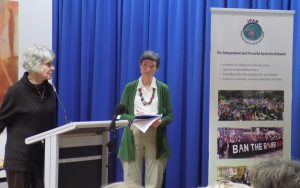
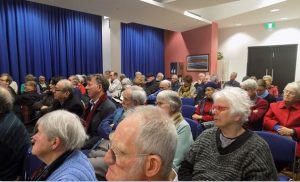
Report by Kathryn Kelly:
On a cold Canberra night, 70 Canberrans braved the weather to attend a forum organised jointly by IPAN groups in the ACT and to hear Professor Ramesh Thakur, Dr Alison Broinowski and Dr Mike Gilligan talk on the Nuclear Weapons Ban Treaty, what the dependence on the US Alliance costs us, and whether Australia can defend itself.
Ramesh’s comments on the nuclear threat were a real wake up call, particularly in light of the dire situation now with North Korea, and the explanation of the importance of the Nuclear Weapons Ban Treaty was very useful information to counter the Government’s spin. The audience found Alison’s strong condemnation of Australia putting all of its foreign policy eggs in one basket very compelling, as well as the idea of the ‘militarisation of thought’. And we don’t often give enough thought to the actual on the ground (or in the air) needs that Australia has for our defence, so Mike’s information on the technology which means that Australia can defend itself was new, or a reminder to most people. Overall the talks complemented each other perfectly.
Click & listen to the Forum speakers
Trump sells Saudi Arabia mammoth $350 billion in weapons over ten years
Trump – on his first overseas tour as president – regaled Middle East leaders with florid words about “peace and prosperity” and a faux pretense of historical appreciation, referring to the region as the “cradle of civilization,” a “sacred land” and “rich heritage.”
There were minimal details in how Trump would achieve peace between the Israelis and Palestinians, or defeat terrorism in the Middle East. It was all the just feel-good rhetoric that papered over the systemic causes of conflict and terrorism.
The one tangible takeaway was the American president’s mammoth arms deal signed with Saudi Arabia – $350 billion-worth over ten years. It was hailed as the biggest ever weapons contract, with an initial payment of $110 billion. Put in perspective, Trump is selling the Saudi rulers a total three times what Obama managed to achieve over his two administrations – some $115 billion in weapons to Saudi Arabia, which itself was a record high.
The proposed weapons supply is truly staggering, not least because of their destination to a regime up to its eyes in terror sponsorship.
The Ongoing Disaster of Australia’s Policy in Afghanistan
by James O’Neill
https://journal-neo.org/2017/05/22/the-ongoing-disaster-of-australia-s-policy-in-afghanistan/
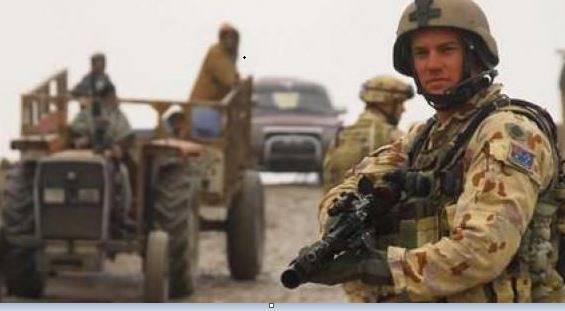 According to a recent news report Australia is “open” to a request from the United States for more troops to be sent to Afghanistan. According to the report, Australian troops “mostly work in a training and support role aimed at strengthening the Afghan force’s ability to protect their own country. “ “It is important, said Prime Minister Malcolm Turnbull, “that we work together to build up the capacity of Afghanistan’s own security forces so that they can keep that country secure from the threat of terrorism.”
According to a recent news report Australia is “open” to a request from the United States for more troops to be sent to Afghanistan. According to the report, Australian troops “mostly work in a training and support role aimed at strengthening the Afghan force’s ability to protect their own country. “ “It is important, said Prime Minister Malcolm Turnbull, “that we work together to build up the capacity of Afghanistan’s own security forces so that they can keep that country secure from the threat of terrorism.”
There was no opposition to this suggestion from Labor leader Bill Shorten, and neither did the country’s media outlets bother to consider either the inherent absurdity of the Prime Minister’s statement, or consider the geopolitical context that prevails in Afghanistan.
https://journal-neo.org/2017/05/22/the-ongoing-disaster-of-australia-s-policy-in-afghanistan/
Victory at the UN – Agreement by 122 countries on a Treaty banning Nuclear Weapons
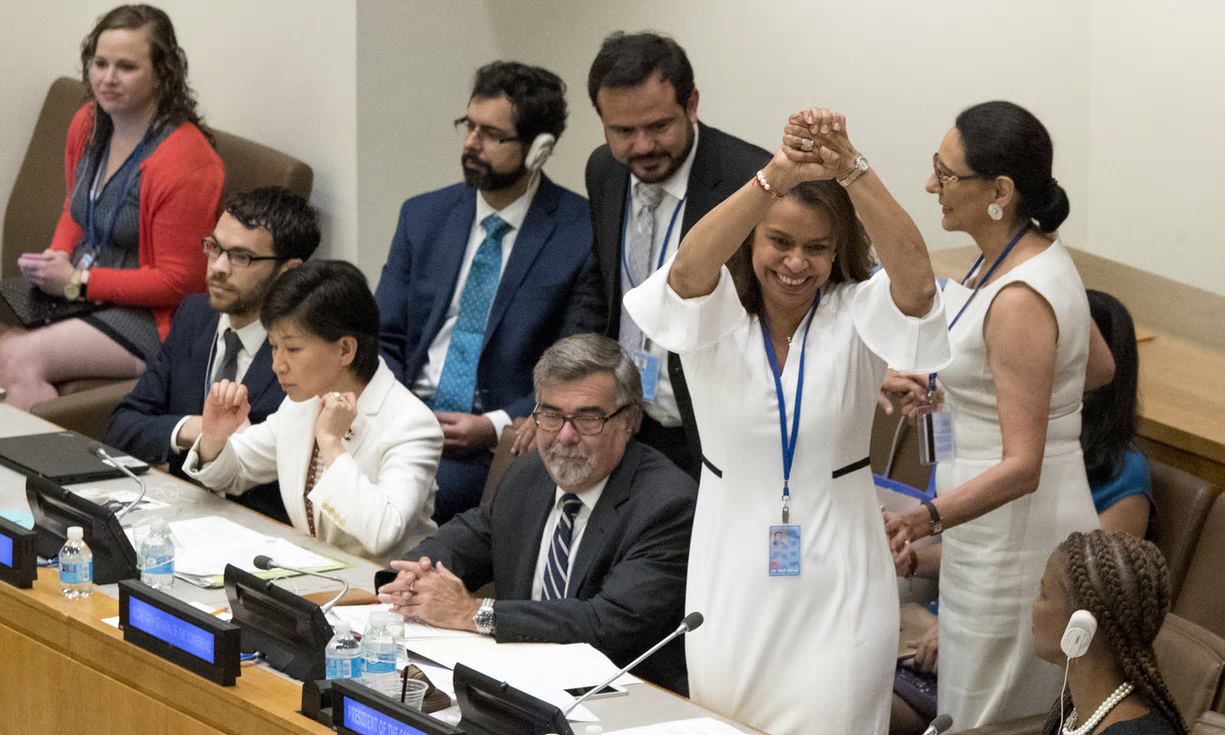 Elayne Whyte Gómez, president of the UN conference on nuclear weapons, reacts after the vote. Photograph: Mary Altaffer/AP
Elayne Whyte Gómez, president of the UN conference on nuclear weapons, reacts after the vote. Photograph: Mary Altaffer/AP
More than 70 years after the world witnessed the devastating power of nuclear weapons, a global treaty has been approved to ban the bombs, a move that supporters hope will lead to the eventual elimination of all nuclear arms.
The treaty was endorsed by 122 countries at the United Nations headquarters in New York on Friday,7th July, 2017 after months of talks in the face of strong opposition from nuclear-armed states and their allies. Only the Netherlands, which took part in the discussion, despite having US nuclear weapons on its territory, voted against the treaty.
All of the countries that bear nuclear arms and many others that either come under their protection or host weapons on their soil boycotted the negotiations. The most vocal critic of the discussions, the US, pointed to the escalation of North Korea’s nuclear and ballistic missile programme as one reason to retain its nuclear capability. The UK did not attend the talks despite government claims to support multilateral disarmament.
“It’s been seven decades since the world knew the power of destruction of nuclear weapons and since day one there was a call to prohibit nuclear weapons,” Elayne Whyte Gómez, president of the UN conference, told the Guardian. “This is a very clear statement that the international community wants to move to a completely different security paradigm that does not include nuclear weapons.”
The 10-page treaty on the prohibition of nuclear weapons will be open for signatures from any UN member state on 20 September during the annual general assembly. While countries that possess nuclear weapons are not expected to sign up any time soon, supporters of the treaty believe it marks an important step towards a nuclear-free world by banning the weapons under international law.
“It’s a prohibition in line with other prohibitions on weapons of mass destruction,” said Beatrice Fihn at the International Campaign to Abolish Nuclear Weapons in Geneva. “We banned biological weapons 45 years ago, we banned chemical weapons 25 years ago, and today we are banning nuclear weapons.” Within two years the treaty could have the 50-state ratifications that it needs to enter into international law, she said.
Previous UN treaties have been effective even when key nations have failed to sign up to them. The US did not sign up to the landmines treaty, but has completely aligned its landmines policy to comply nonetheless. “These kinds of treaties have an impact that forces countries to change their behaviour. It is not going to happen fast, but it does affect them,” Fihn said. “We have seen on all other weapons that prohibition comes first, and then elimination. This is taking the first step towards elimination.”
Under the new treaty, signatory states must agree not to develop, test, manufacture or possess nuclear weapons, or threaten to use them, or allow any nuclear arms to be stationed on their territory.
Around 150 West Papuan people in Nabire arrested, including children. Many tortured.
JULY 8, 2017 – Free West Papua Campaign
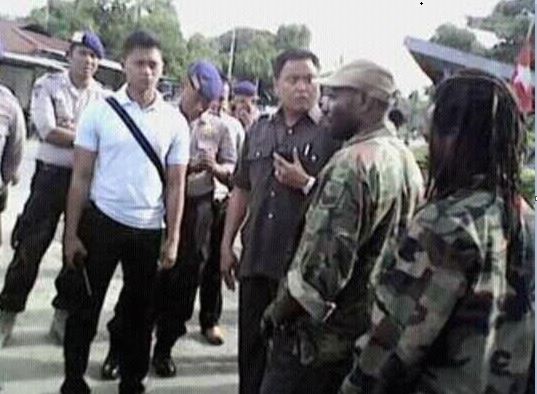 JULY 8, 2017 -Free West PapuA Campaign
JULY 8, 2017 -Free West PapuA Campaign
URGENT NEWS – We have received urgent reports from West Papua that between 30th June and 6th July, around 150 West Papuan people were arrested and many of them tortured, by the Indonesian police for peaceful actions. A chronology of events reported follows.
Understanding Korea
by Bruce Cummings (Global Research, 17th May, 2017)
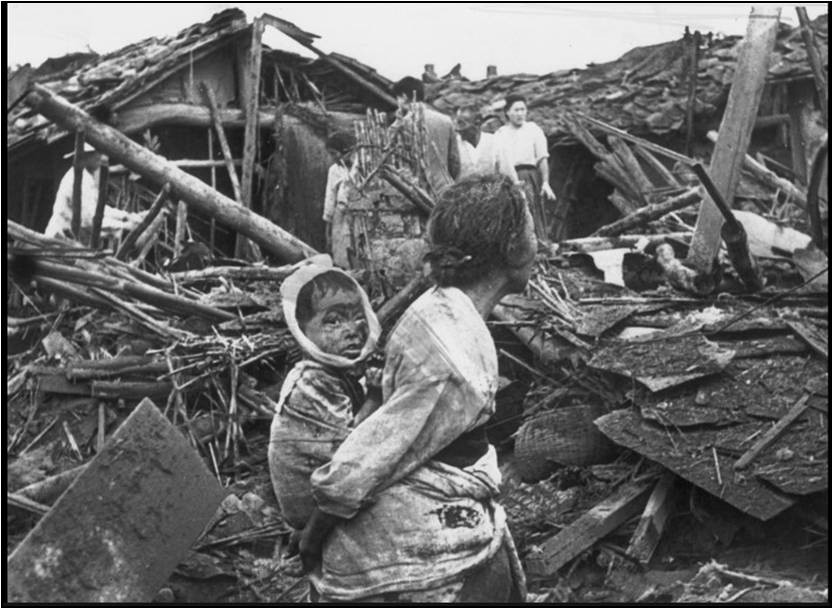 Residents of Pyongyang in aftermath of US bombing raids in Korean War
Residents of Pyongyang in aftermath of US bombing raids in Korean War
More than four decades ago I went to lunch with a diplomatic historian who, like me, was going through Korea-related documents at the National Archives in Washington. He happened to remark that he sometimes wondered whether the Korean Demilitarised Zone might be ground zero for the end of the world. This April, Kim In-ryong, a North Korean diplomat at the UN, warned of ‘a dangerous situation in which a thermonuclear war may break out at any moment’. A few days later, President Trump told Reuters that ‘we could end up having a major, major conflict with North Korea.’
American atmospheric scientists have shown that even a relatively contained nuclear war would throw up enough soot and debris to threaten the global population:
‘A regional war between India and Pakistan, for instance, has the potential to dramatically damage Europe, the US and other regions through global ozone loss and climate change.’
How is it possible that we have come to this? How does a puffed-up, vainglorious narcissist, whose every other word may well be a lie (that applies to both of them, Trump and Kim Jong-un), come not only to hold the peace of the world in his hands but perhaps the future of the planet? We have arrived at this point because of an inveterate unwillingness on the part of Americans to look history in the face and a laser-like focus on that same history by the leaders of North Korea.
Ban the Bomb – Speech by Stephen Darley at Adelaide Rally
The world is closer to catastrophe than it has been since 1953, according to the Bulletin of Atomic Scientists Doomsday Clock. That was the year the Soviets first tested a hydrogen bomb – and the world realised it was involved in a full-scale nuclear arms race. Of course, climate change is a significant part of the “2-and-a-half minutes to midnight” prediction – but so is the heightened threat of nuclear war.
Australia has recently been visited by Senator John McCain. He is a senior Republican, and Chair of the Senate Armed Services Committee. He is an authentic spokesman for American aggression and exceptionalism (that is, the doctrine that the US is a special state that can and should get away with doing things internationally that no other country could).
Brisbane “Ban the Bomb” Public Forum-13th July
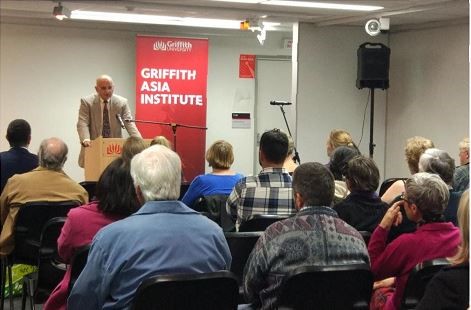
This public lecture reported on the recent ground-breaking UN Nuclear Weapon Prohibition Treaty and was delivered by the esteemed Professor Ramesh Thakur, the Goodwill Ambassador for the UNAA in Nuclear Non-Proliferation and Disarmament. Just Peace Qld and the United Nations Association of Australia Qld held this public event within the Griffith Asia Institute with the beautiful backdrop of the Brisbane city skyline. There was a decent turnout to the event with a large number of seats filled, particularly by the members of Just Peace who turned out in full force for the forum.
The event’s speaker, Professor Thakur, has recently been featured in the Japan Times to answer the question of “Will the UN vote take us closer to a nuclear-free world?” He has also featured within the Australian Strategic Policy Institute (ASPI) to write about “Understanding the UN’s new treaty on the prohibition of nuclear weapons.
Ngara Institute- Activists awarded for making a stand against Adani
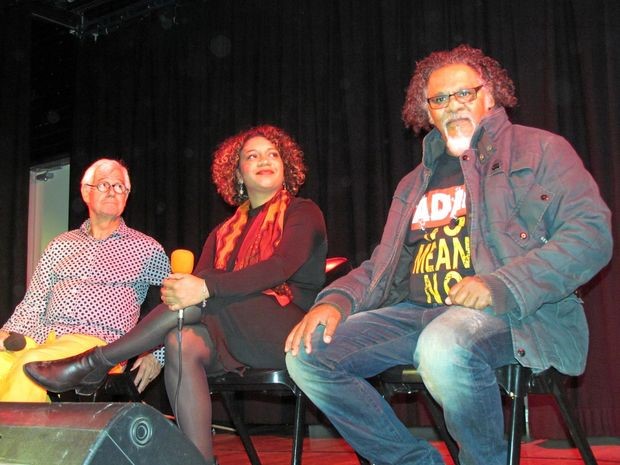 Julian Burnside QC alongside anti-Adani mine campaigners Adrian Burragubba and Murrawah Johnson (centre) at the inaugural Ngara Institute Activist of the Year award at Mullumbimby on Saturday, July 1, 2017- Photo by Nick Todd
Julian Burnside QC alongside anti-Adani mine campaigners Adrian Burragubba and Murrawah Johnson (centre) at the inaugural Ngara Institute Activist of the Year award at Mullumbimby on Saturday, July 1, 2017- Photo by Nick Todd
THE dual fight for Aboriginal rights, combined with the fight against dirty coal at the proposed $21 billion Adani Carmichael mine in central Queensland, came to the Northern Rivers on Saturday.
Aboriginal activists Adrian Burragubba and his niece Murrawah Johnson, representing the Jagalingou Traditional Owners Family Council in Queensland’s Galilee Basin, west of Rockhampton, were awarded the inaugural Ngara Institute Activist of the Year award before a capacity crowd at the Mullumbimby Civic Hall.
Presenting the award and delivering the keynote address was renowned “Resisting things that are plainly wrong, and supporting things that are plainly right will always have a future,” Mr Burnside said.human rights activist Julian Burnside QC, who spoke on the history of activism from Roman times, through slavery, to today’s fight for the support of refugees and the environment.
“Resisting things that are plainly wrong, and supporting things that are plainly right will always have a future,” Mr Burnside said.
Australian Universities becoming militarised
by Alex Edney-Browne
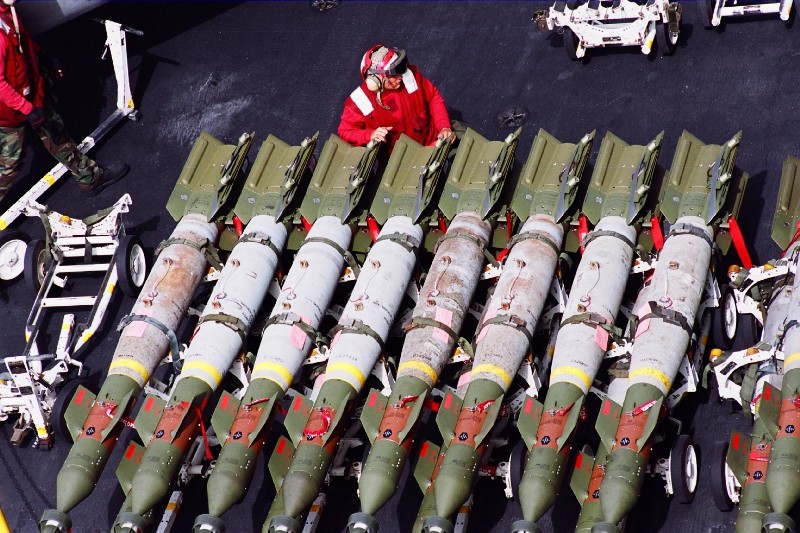 GBU 12 Paveway II bombs (500b), built by Lockheed Martin
GBU 12 Paveway II bombs (500b), built by Lockheed Martin
We have been labelled “Millennials” and “Generation Y”, but not the “War on Terror Generation”. Our lives are not considered to have been profoundly affected by war, unlike our great grandparents and grandparents — the “Lost” and “G.I” generations respectively.Why do few people make this connection? The fresh-faced students who started their first university classes last week were born in 1999–2000. They have no memories of the world before the September 11th attacks and the subsequent passage of the Authorisation for Use of Military Force (AUMF) through US Congress. This is the case for most of Australia’s undergraduate and postgraduate students who were children in 2001. Now young adults, legislation that was passed just nine days after 9/11 continues to provide legal justification for military intervention in countries and against individuals and groups who had no part in the attacks. Australia, a key ally to the United States in the “war on terror”, has never fought a longer war.
In contrast to people our age in Iraq, Afghanistan, Syria, Yemen, Somalia, Libya and parts of Pakistan, only a handful of us have lost family members or friends to the “war on terror” (to date, 44 Australians have died). We are safely thousands of miles away from airplanes and drones, dropping bombs and firing missiles, inflicting psychological trauma and frequently killing civilians. This does not mean, however, that the effects of a sixteen-year war have not been felt at home.
Coming event: Hiroshima Day March and Rally, Newcastle
Hunter Peace Group invites you to their Hiroshima Day Peace March & Rally
Sunday 6th August, 10 am
March from Break Block Park to Newcastle Civic Park,
Speakers:
- Associate Prof Wayne Reynolds
- Gem Romuld
- Theo Bougatsas
Entertainment by the Peoples Chorus and Threepence

